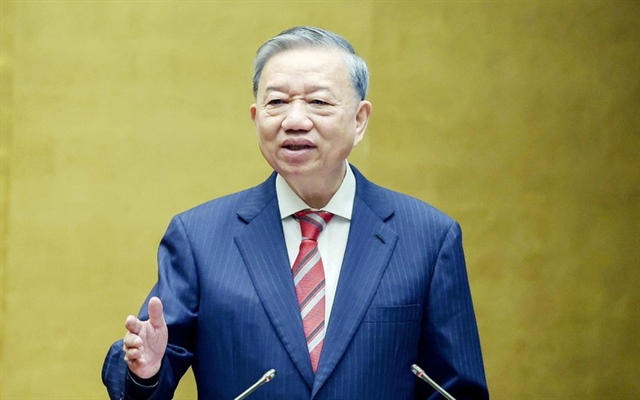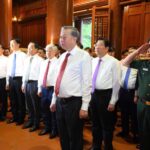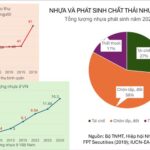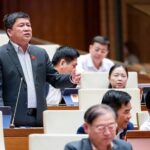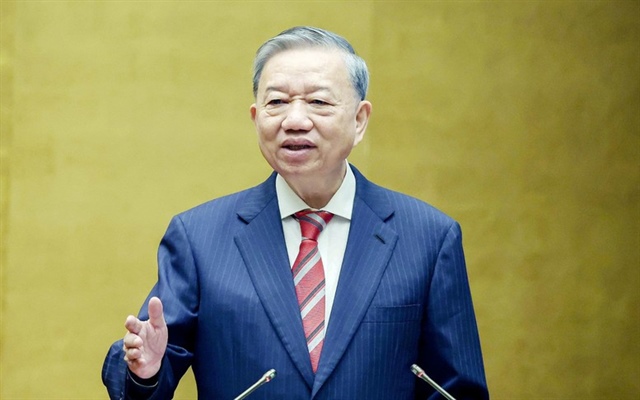
General Secretary To Lam: Practicing thrift and combating wastefulness is a shared responsibility |
Thrift and waste reduction are two organically connected components and two pillars for achieving prosperity and wealth for families, the nation, and society. Practicing thrift and combating waste are necessary in the lives of individuals and society as a whole, and they are the “cornerstone” of building a civilized and sustainably developing society. It must be a shared responsibility and become a daily habit and culture for all of us.
Vietnamese culture is associated with a frugal and simple lifestyle. As a result, the practice of thrift among Vietnamese people has been encapsulated in proverbs and folk songs passed down from generation to generation, such as “Khéo ăn thì no, khéo co thì ấm” (“Those who know how to eat will never go hungry, and those who know how to save will never be cold”), “Ít chắt chiu hơn nhiều phung phí” (“Saving a little is better than wasting a lot”), and “Ai ơi chớ bỏ ruộng hoang/Bao nhiêu tấc đất tấc vàng bấy nhiêu” (“Don’t neglect your fields, every inch of land is as precious as gold”).
President Ho Chi Minh, the leader of the Vietnamese Revolution, set an exemplary model for practicing thrift. Immediately after the success of the August Revolution, facing the threats of hunger, ignorance, and foreign invaders, at the first meeting of the Provisional Government of the Democratic Republic of Vietnam on September 3, 1945, President Ho Chi Minh raised six urgent issues, with a particular emphasis on promoting the movement for increased production and thrift to combat hunger and build the country. On many occasions, Uncle Ho explained the concept of thrift to ensure that people understood it correctly and practiced it effectively: “Thrift means not being extravagant, wasteful, or careless… Thrift does not mean being stingy. When it is not necessary to spend, not even a single penny should be spent. When there is a worthy cause, something beneficial to our compatriots and our nation, we should be happy to spend as much money and effort as needed. That is true thrift. Thrift must resolutely oppose extravagance… Therefore, extravagance is a crime against the nation and the people.” He considered thrift to be an important art of social life. He emphasized the need to save labor: “one person does the work of two or three”; save time: “Be punctual, don’t arrive late or leave early. Work efficiently and thoroughly. Finish today’s work today, don’t put it off until tomorrow. Remember that the people pay your salary with their sweat and tears for those hours. Being lazy is cheating the people.” He instructed the government to save money, the people’s strength, and the blood and lives of soldiers and citizens: “We must cherish human resources, which are our most valuable asset. We should take good care of the people’s health and make rational use of their labor.” “Wealth can be rebuilt, and time will come again. But once our soldiers are gone, they are gone forever.” Therefore, “we must cherish every drop of our compatriots’ blood to build the future of our nation.” Or save words: “Talk less, do more,” “Start with action.”
During the revolutionary periods, our Party and State have always paid special attention to practicing thrift and considered it a top priority. During the war, under the leadership of the Party and President Ho Chi Minh, and with the exemplary role of cadres, party members, and the people, we managed our expenses rationally and practiced thrift. Every citizen tightened their belts, endured hardships, and sacrificed their personal interests to support the front lines, thus concentrating our resources on national liberation. Entering the renewal period, our Party has issued many directives on this issue, such as Directive No. 21-CT/TW dated December 21, 2012, of the 11th Secretariat on promoting the practice of thrift and combating waste; Directive No. 27-CT/TW dated December 25, 2023, of the 13th Politburo on strengthening the Party’s leadership in practicing thrift and combating waste; Directive No. 42-CT/TW dated January 16, 2025, of the 13th Politburo on strengthening the Party’s leadership in educating about thrift, frugality, integrity, uprightness, and dedication; Directive No. 05-CT/TW dated May 15, 2016, of the Politburo on studying and following the ideology, morality, and style of Ho Chi Minh, which clearly states: “Organize study and propagate… Ho Chi Minh’s ideology and exemplary morals in thrift, frugality, integrity, uprightness, and dedication”; Regulation No. 37-QD/TW dated October 25, 2021, of the Central Executive Committee on things that party members must not do, prohibiting party members from “Organizing weddings, funerals, and other personal events extravagantly or for profit.” To institutionalize the Party’s policies, the Standing Committee of the 10th National Assembly issued the Ordinance on Practicing Thrift and Combating Waste in 1998; the 11th National Assembly promulgated the Law on Practicing Thrift and Combating Waste in 2005, and the 13th National Assembly amended and supplemented it in 2013; the 2013 Constitution also stipulates that “Agencies, organizations, and individuals must practice thrift and combat waste, corruption, and negative behavior in socio-economic activities and state management” (Article 56); every year and for each period, the Government issues a general program on practicing thrift and combating waste.
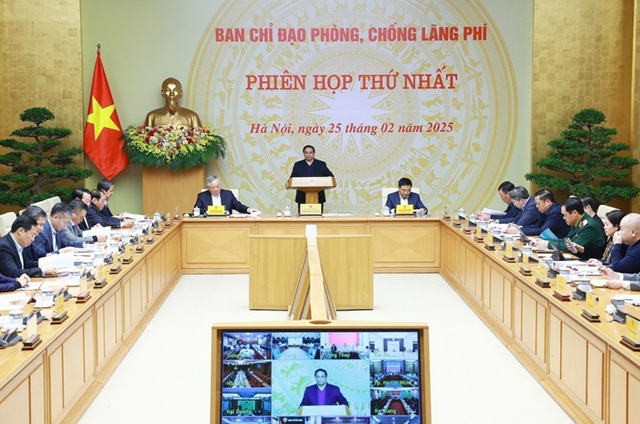 Prime Minister Pham Minh Chinh chairs the first meeting of the Steering Committee for Waste Prevention
|
Implementing the Party’s guidelines and the State’s laws and policies, practicing thrift throughout the Party, the people, and the army has achieved many positive results. Organizations and individuals, especially cadres and party members, have focused on saving regular expenses and enhancing the role of leaders in practicing thrift. Some agencies and units, when organizing conferences or celebrating anniversaries, have issued notices stating, “Practice thrift, do not accept congratulatory flowers.” Many reviews and summaries have been conducted concisely, simply, and economically by various levels and sectors, saving time and avoiding the use of paper documents, and using online meetings to save costs. The practice of sharing vehicles for senior officials on business trips has also been implemented in many places. The situation of abandoned land and prolonged planning has been gradually resolved. The management and use of office premises have basically complied with purposes, norms, and standards. Many businesses have improved the management of indirect production costs, especially indirect costs, to reduce product prices; cut production and business costs, and enhanced the management of consumption norms to improve production and business efficiency. Especially from the end of 2024 up to now, following the conclusions of the Central Committee, the Politburo, and the Secretariat, the basic completion of the arrangement and streamlining of the apparatus of Party, Government, National Assembly, and Fatherland Front organizations at the central and local levels has been directed; thus, reducing costs and creating conditions for implementing the policy of exempting tuition fees for students. In addition, according to preliminary calculations, when implementing the policy agreed upon by the 11th Central Committee to merge provinces, not organize district-level governments, and merge communes, the annual savings in regular expenditures of the state budget for the 2025-2030 period will be more than VND 20,000 billion/year; from 2030 onwards, the savings will be over VND 30,000 billion per year. This does not yet include the specific value of more than 18,500 premises of agencies and units that will no longer function as “offices” when implementing the model of two-level local government.
Along with the achievements, there are still many shortcomings and limitations in practicing thrift, with very low efficiency. The policies on thrift have not been truly effective; waste and loss of assets and state budget have occurred on a large scale, causing serious consequences. Practicing thrift has not become a regular practice; thrift has not become a constant awareness of a part of cadres, party members, civil servants, public employees, and the people. Wastefulness exists not only in state agencies but also in the social activities of the people. The tendency to favor foreign, luxurious, branded, and expensive goods and to give expensive gifts; the psychology of enjoyment among a part of the people, especially the youth, while the country’s average income has just crossed the middle-income threshold, and labor productivity is low… are worrying manifestations of the practice of thrift. Along with the majority of cadres and party members who always uphold the spirit of the Party, set good examples, take the lead in practicing thrift and combating waste, and have a high sense of responsibility in managing, using, and saving public property, not falling into the “vortex” of power, money, extravagance, and enjoyment, there is still a not-so-small number of cadres and party members, including leaders, who lack a sense of responsibility, indulge in enjoyment and materialism, cause financial losses and waste, and use public funds for personal or group interests.
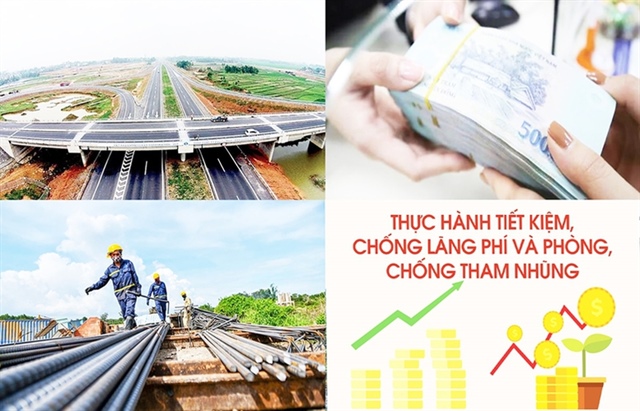 Vigorously implement fundamental solutions to create substantive changes in practicing thrift and combating waste |
The main reasons for the above-mentioned shortcomings and limitations are the lack of high responsibility and determination of some agencies, organizations, and individuals, as well as the lack of consistency and decisiveness. The practice of thrift and waste reduction is sometimes formal and perfunctory. Some ministries, sectors, and localities are not proactive in building solutions to implement thrift and waste reduction in their assigned fields and scopes of management. The Law on Practicing Thrift and Combating Waste has not really been brought into life, and the provisions are still general, leading to a lack of effective mechanisms and measures for implementation. The program on practicing thrift and combating waste is still formalistic and has not penetrated the reality of each agency, unit, locality, family, and individual, nor has it set specific goals, indicators, and evaluation criteria. Many waste and violations have been detected but not handled promptly; there has been a lack of timely commendation and reward for those who practice thrift or detect waste, resulting in a lack of discipline in complying with the law. The inspection and supervision of thrift practices and waste reduction at all levels and sectors have not been effective.
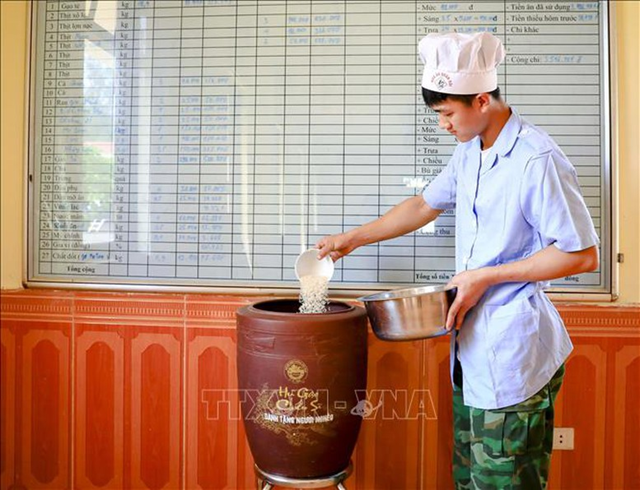
At Muong Muon Border Guard Post (Muong Cha district, Dien Bien province), before each meal, soldiers put aside a bowl of rice to fill the “Soldiers’ Rice Jar”
|
The 11th Plenum of the 13th Central Committee agreed on historic decisions, including continuing to rearrange the organizational apparatus of the political system, merging some provinces, not organizing district-level governments, and merging communes, creating a premise for a substantive change in practicing thrift in our country in the new period. To meet the highest requirements of the new revolutionary period agreed upon by the 11th Plenum, which are “high-quality development, fast development, and sustainable development,” “proactivity, self-reliance, and autonomy in development,” and the highest goal of “stabilizing and improving people’s lives,” successfully achieving the two centenary goals, along with arranging a streamlined and strong organizational apparatus with high efficiency, capacity, and effectiveness, we need to focus on the following issues:
First,
unify the perception that practicing thrift and combating waste is one of the most fundamental solutions for the country to overcome all storms in the context of international fluctuations directly and comprehensively affecting socio-economic development and ensuring social security. Historical facts have proved that thrift is one of the key factors in creating great potential for the entire Party, people, and army to win against foreign invaders and achieve national liberation, even in the context of economic poverty and people’s difficult lives, or in the face of “hunger.” Facing new difficulties and challenges, with our tradition of perseverance and indomitability, and with the unanimity of the entire political system and the people, by promoting the practice of thrift and combating waste, we will create great internal strength and internal resources to promote the sustainable development of the economy, helping the country to move forward and achieve strategic goals, while taking better care of the people’s lives. Therefore, all citizens, agencies, units, organizations, and businesses need to have specific plans and rationalize their income and expenses; cadres and party members, especially leaders and managers, must set good examples and encourage their families and the people to actively participate; all sectors, all professions, all households, and all individuals need to promote production and business, improve labor productivity, quality, and efficiency, and thoroughly practice thrift, minimizing waste of time, money, property, and strength.
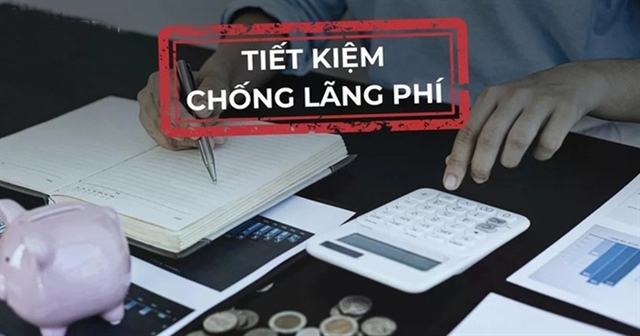
Study and propose the annual organization of “National Thrift Day” |
Second,
vigorously implement fundamental solutions to create substantive changes in practicing thrift and combating waste. The focus is: (i) Focus on perfecting the institution to thoroughly overcome the waste caused by the institution, remove obstacles and difficulties hindering development, and unblock bottlenecks to create a foundation for development, especially issues related to bidding, budget, public investment, private sector, science and technology, innovation and digital transformation, and the revolution in arranging and streamlining the organizational apparatus of the political system. Soon study to amend and supplement the Law on Practicing Thrift and Combating Waste, creating a comprehensive political and legal basis for practicing thrift in all sectors, all professions, all cadres and party members, and all people. (ii) Maximize the reduction of administrative procedures and compliance costs, creating the most favorable conditions for people and businesses; shift from pre-inspection to post-inspection, eliminate the “application-approval” mechanism, decentralize and empower competent agencies and localities to resolve and take responsibility. In 2025, ensure that 100% of administrative procedures related to enterprises are performed online smoothly and effectively, and 100% of administrative procedures are not limited by provincial administrative boundaries. (iii) After arranging the organizational apparatus of the political system to be streamlined and strong, to operate with high efficiency, capacity, and effectiveness, a very fundamental factor is to focus on building a contingent of officials with knowledge, skills, and correct working attitudes to achieve the highest efficiency in each field they are in charge of. In particular, management and professional skills, passion and responsibility in each job and task, and standard cultural behavior in communication and interaction, and awareness of proactive thrift are required of officials in the new apparatus. (iv) Strengthen discipline and rules in the management and use of financial and budgetary resources; practice thrift and combat waste, and effectively use state financial resources in association with mobilizing social resources and streamlining the apparatus. Strengthen the management and use of public property, ensuring compliance with norms, standards, and regulations and suitability for tasks, focusing on the arrangement and handling of assets, especially houses and land, in association with the arrangement and streamlining of the apparatus. Resolutely and drastically save unnecessary expenses to ensure resources for natural disaster prevention and control, epidemic prevention, and investment for development and economic development; strive to increase the rate of breakthrough investment in science and technology, innovation and national digital transformation, and support for the development of the private sector. (v) Create a legal corridor and resources for the development of the private sector, promote the spirit of entrepreneurship and innovation in the whole society, and create conditions for all people to contribute, increase labor productivity, and enrich themselves, their families, and society.
Third,
build a culture of thrift; make practicing thrift and combating waste become “voluntary,” “spontaneous,” and “daily practice.” Study and propose the annual organization of “National Thrift Day” to promote and spread the movement throughout society, raising awareness of practicing thrift. Promote the movement “Studying and following the ideology, morality, and style of Ho Chi Minh”; promptly commend and reward cadres, soldiers, and people who have good initiatives in their work and business, bringing practical effects in practicing thrift, and have forms of strict handling for collectives and individuals, first of all, the heads of agencies and units in the political system and party members who do not fully implement the Law on Practicing Thrift and Combating Waste. Continue to promote the fight against corruption, waste, and negative phenomena, considering this as one of the fundamental solutions to contribute to building a culture of thrift.
In his Report to the Fourth Congress of the Communist International, V.I. Lenin emphasized, “However, we must streamline this state apparatus, we must save as much as possible, save on everything, even on schools. We must do this because we know that if we do not save heavy industry
“General Secretary To Lam visits Kim Lien Relic Site and presents gifts in Nam Dan District.”
On the occasion of the 135th anniversary of President Ho Chi Minh’s birth (May 19, 1890 – May 19, 2025), on May 15, 2025, General Secretary To Lam, along with a delegation of central and provincial leaders from Nghe An, paid a visit to the Kim Lien National Special Relic Site in Nam Dan District, Nghe An Province.
The Only Ward in Hue That Didn’t Undergo Merger: What Makes It So Special?
The picturesque neighborhood of Duong No in the heart of Thuan Hoa district stands out as a unique entity among the 133 administrative wards that comprise the vibrant city of Hue. With a rich tapestry of cultural, historical, and natural elements, this charming locale has resisted the tide of mergers and reorganizations that have swept through other communities since the beginning of 2025.
The Packaging Industry’s Green Evolution: Tackling the Plastic Waste Challenge
The Vietnamese packaging industry faces sustainability challenges due to rising plastic consumption, which is projected to surpass 11 million tons by 2025. To address this issue, businesses must proactively transform their operations by embracing eco-friendly solutions, reducing emissions, and promoting a circular economy.

